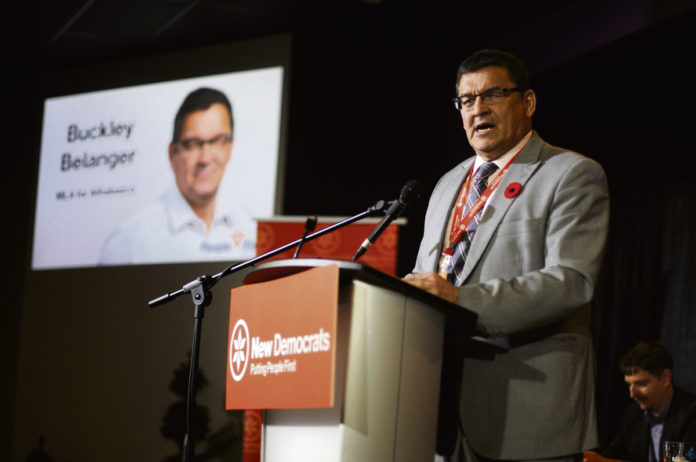Indigenous people of Canada have been fighting for the rights to their land for many years now and after the provincial government moved a trappers’ cabin without his knowledge, the fight for land rights is becoming more serious.
It’s this incident that inspired Buckley Belanger to run for re-election for MLA of Ile-a-la-Crosse.
“We’ve been trying to fight for northerner’s right to access their backyard for years.” Belanger said. “And we’re finding that this particular government is showing disrespect for people that build traditional cabins, people that have tried to go where their grandfather or grandmother have for years and enjoy the natural resources of northern lands.”
Belanger goes on to say that the government has shown “callousness and disregard for northern people.” Belanger isn’t just referring to Indigenous people when he talks about the north, he refers to those living in the north, whether they be Indigenous or non-Indigenous. Because there are many non-Indigenous people who have made a life in the north.
“If I want to fight for the northerner’s right to land in their backyard, then I have to show up for that fight,” said Belanger.
“And that’s one of the reasons that I’ve decided to run again.”
Richard Durocher, the man whose cabin was seized, was denied his application for building a cabin, but was encouraged by Métis officials to build it anyway.
A spokesperson for the Ministry of Environment said they had attempted to work with Durocher in finding a different site for his cabin. The spokesperson said cabin builds aren’t allowed within eight kilometres of either side of the Key Lake, Cigar Lake, McArthur Lake, Cluff Lake and Rabbit Lake roads. The Durocher family is known to have used the land for traditional activities long before the highway to the mine site was built.
The province also claims that the site is popular for various recreation activities, like fishing and camping.
Durocher’s case raises concerns about recreational use prioritized over traditional use.
Belanger says there is more that the government needs to do for the north than approve land claims.
“They (the government) haven’t done anything for northern Saskatchewan.” Says Belanger. “If you look at what’s happening at the Estevan area, they are phasing out the coal industry simply because of the greenhouse gas emissions and this particular government put 10 million dollars into that phase-out process, to have workers re-trained and look at alternative opportunities for employment, that kind of thing.”
The Saskatchewan government has promised $10 million to the province over the next few years to help phase out coal by 2030. The areas to receive financial help are:
• Southeast Regional College.
• Sunrise Community Futures Development Corporation.
• South Central Community Futures Development Corporation.
• City of Estevan.
• Town of Coronach.
None of which are located in the north.
Belanger compares the phasing out of coal to northern mine sites shutting down and the lack of provincial help.
“You look at northern Saskatchewan where the mine’s shut down, there was 900 people put out of work.” Said Belanger. “Not one red cent was put in to help re-train or to help find alternative employment. And that’s the kind of argument I’m trying to make… the northern jobs are important too, this government has totally ignored that reality that the effect of families out in that area has been very dramatic in a negative way.”
FSIN Chief Bobby Cameron said in he was ready to advocate for compensation packages for Indigenous workers that were laid off, in 2018. And even if they are/were properly compensated, Indigenous people will have to live with the environmental impacts once resources in the northern mines are depleted.
The north has also experienced job loss through the closing of STC and the shut down of the Buffalo Narrows Correctional Center.
“It really impacted travel of the northern people.” Belanger said of STC closing. “And supplies for businesses of the north, they didn’t take that into consideration.”
The Saskatchewan government has stated that the closure of STC would save taxpayers $85 million over five years. Others argue though the bus company was still used by low-income earners, medical patients, and seniors.
As for the Buffalo Narrows Correctional Center, not only did they lay-off 14 people, but they also had a more holistic way of treating its prisoners.
“The staff were doing a really good job of rehabilitating some of the prisoners.” Belanger says of the correctional center. “And now they’re being sent to a bigger and tougher jail in the PA area.”
Belanger says that the provincial government “has not invested in the north at all.”
Despite the lack of investment from the government, Belanger commends northern people on their resilience.
“We’re not asking for any pity or any handouts.” Said Belanger. “We’re just asking for equal treatment.


